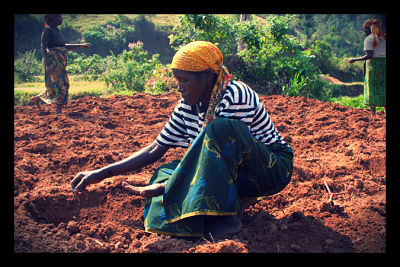Agriculture in the Developing World

Large corporations, NGOs, and regional nonprofit groups have begun to recognize the importance of sustainable agriculture. The facts facing all of them include a burgeoning world population and projected rising incomes from more people coming in the future. The issue becomes trickier when the additional food that must be cultivated needs to be nutritious to combat diseases, many of which are attributed to malnutrition. If that demand is not met, a larger public health crisis ensues that leads to stunted economic growth and social upheaval over food prices.
One major area of the world that is a proverbial difference-maker in ensuring the future population is fed properly is sub-Saharan Africa. The region, containing over 202 million potential hectares of usable, arable land has yet to do anything with it. AllAfrica cites a recent press release by the World Bank in July 2013, calling for leaders in the region to do more with the resources at their disposal. The World Bank points out that despite the immense potential of the African continent, a lack of good governance, development, infrastructure, and education for it’s people is limiting nations from becoming modern and self-sufficient.
A promising development is an action plan noted by The World Bank that would if followed in full, end poverty in Africa within the next decade. By instituting reforms to document all lands, ending government corruption that doesn’t favor the majority of national populations, and motivating all Africans to support the broad changes, food security will be ensured. Increased foreign interest and investment in the continent coupled with rising commodity prices, basic legal structures that already exist, and more technology mean starting the massive effort will be much easier.
With the issue captured in an international spotlight, “The World Bank Group supports and endorses the Voluntary Guidelines on the Responsible Governance of Tenure of Land, Fisheries and Forests in the Context of National Food Security…” What this means essentially is that the immense amount of land available in Africa will be properly sold and used. To assess the progress of individual nations, The World Bank Group has implemented the Land Governance Assessment Framework (LGAF).
The aforementioned efforts of smaller, private and nonprofit groups to help the situation are exemplified in various innovative investment competitions. The Global Food and Health Innovation (GFHI) Challenge, concluding in August 2013, is one such opportunity accepting proposals for different technologies or approaches to tackle agricultural challenges like the ones in sub-Saharan Africa. Not only will this introduce a wealth of fresh ideas and tools, but it may also translate into jobs that will provide an economic boost. Along with changes championed by major geopolitical groups, these key investments will help finally bring an end to global poverty within our lifetime.
– David Smith
Sources: Diplomatic Courier, All Africa, GFHI Challenge
Photo: Farmland Grab
